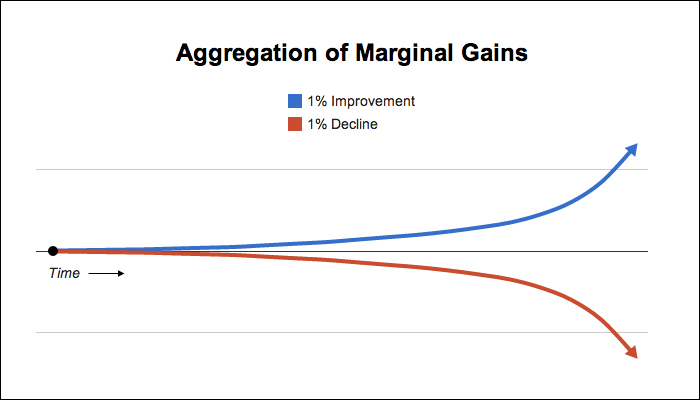Clear James wrote about the use of behavioral science to control your habits and improve your health. His guide, transform your habits, has been downloaded more than 80,000 times. This post originally appeared on his blog.
In 2010, Dave Brailsford faces a difficult task.
New York, meet the tech world scene
5000 Tech leaders coming to New York in November to learn and do business. This is your chance to join them.
No British rider had ever won the Tour de France, but that the new general manager and director of the performance of Team Sky (professional cycling team Great Britain), Brailsford was asked to change that.
His approach was simple.
Brailsford believed in a concept he calls "aggregation of marginal gains." He explained that "the margin of 1 percent improvement in everything you do." His belief was that if you have improved all areas related to cycling only 1 percent, while those small gains in addition to a remarkable improvement.
They began by optimizing the things you might expect :. Nutrition for runners, their weekly training program, the ergonomics of the seat, and the weight of the tires
But Brailsford and his team did not stop there. They searched for 1 percent improvement in tiny areas that have been neglected by almost everyone: find the pillow that offered the best sleep and take with them to the hotel, the tests for the most effective type massage gel, and teaching the user the best way to wash hands to avoid infection. They searched for 1 percent improvements everywhere.
Brailsford believed that if they could successfully execute this strategy, then Team Sky would be able to win the Tour de France in five years.
He was wrong. They won in three years.
In 2012, Sir Sky Team rider Bradley Wiggins became the first British cyclist to win the Tour de France. That same year, Brailsford British cycling team coach at the 2012 Olympic Games and dominated the competition, winning 70 percent of the gold medals available.
In 2013, Team Sky repeated their feat by winning the Tour de France, this time with Chris Froome driver. Many spoke of the British cycling exploits in the Olympics and the Tour de France over the last 10 years as the most successful race in the history of modern cycling.
Now the important question: what can we learn from the approach Brailsford
The aggregation of marginal gains
It's easy to overestimate the importance a decisive moment and to underestimate the value of making better decisions on a daily basis.
Almost all the habits you have - good or bad -. Is the result of many small decisions over time
Yet how easily we forget when we want to make a change.
Very often, we convince ourselves that the change is significant if it is a large, the associated visible result. Whether to lose weight, build a business, traveling the world or any other purpose, we often put pressure on ourselves to make some improvement overwhelming that everyone will talk about.
Meanwhile, the improvement of only 1 percent is not significant (and sometimes it is not even visible). But it can be just as significant, especially in the long term.
And from what I can tell, this model works the same way in reverse. (An aggregation of marginal losses, in other words.) If you find yourself stuck with bad habits or poor results, it is usually not because something happened overnight. It is the sum of many small choices - A 1 percent drop here and there -. That eventually leads to a problem

Initially, it is basically no difference between making a choice that is 1 percent better, or 1 percent worse. (In other words, it will not affect you much today.)
But over time, these small improvements or compounds decreases and there is suddenly a very big gap between people who make slightly better decisions on a daily basis and those who do not. That's why the little choices will not make much difference at the time, but add in the long term.
On a related note, that why I like setting a schedule for the important things, planning for failure and using the rule "never miss twice." I know it is not a big deal if I make a mistake or slip on a habit from time to time. It is the effect of compound never get back on track that causes problems.
by setting a calendar to never miss twice, you can avoid simple errors snowball out of control.
the bottom line
success is a few simple disciplines, practiced every days, while failure is simply a few errors in judgment, repeated every day
-Jim Rohn
you probably will not find yourself in the Tour de France anytime soon. but the concept of aggregation of marginal gains can be useful nonetheless.
Most people love to talk about success (and life in general) as an event. We speak to lose 50 pounds or build a successful business or win the Tour de France as if they are events. But the truth is that most of the important things in life are not independent events, but rather the sum of all the times when we chose to do things one percent better, or 1 percent worse. Aggregating these marginal gains made a difference.
It is common in small victories and slow gains. This is why the returns of the average speed above average results. This is why the system is above the target. That's why mastering your habits is more important than achieving a certain result.
Where are the 1 percent improvements in your life
You get 25,000 morning in adulthood. Here are 8 ways not to waste